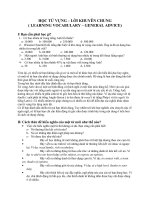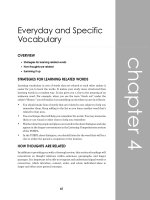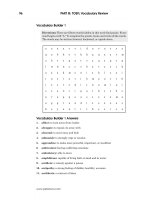Vocabulary general 1 pps
Bạn đang xem bản rút gọn của tài liệu. Xem và tải ngay bản đầy đủ của tài liệu tại đây (60.67 KB, 11 trang )
silicon/silicone
SILICON/SILICONE
Silicon is a chemical element, the basic stuff of which microchips are made. Silicones are plastics and
other materials containing silicon, the most commonly discussed example being silicone breast
implants. Less used by the general public is “silica“: an oxide of silicon.
List of errors
file:///C|/Temp/livres/commonerrors/errors/silicon.html03/09/2005 15:39:58
simplistic
SIMPLISTIC
“Simplistic” means “overly simple,” and is always used negatively. Don’t substitute it when you just
mean to say “simple” or even “very simple.”
List of errors
file:///C|/Temp/livres/commonerrors/errors/simplistic.html03/09/2005 15:39:58
single quotes
SINGLE QUOTES
In standard American writing, the only use for single quotation marks is to designate a quotation
within a quotation. Students are exposed by Penguin Books and other publishers to the British
practice of using single quotes for normal quotations and become confused. Some strange folkloric
process has convinced many people that while entire sentences and long phrases are surrounded by
conventional double quotation marks, single words and short phrases take single quotation marks.
“Wrong,” I insist.
List of errors
file:///C|/Temp/livres/commonerrors/errors/single.html03/09/2005 15:39:58
slight of hand
SLIGHT OF HAND
SLEIGHT OF HAND
“Sleight” is an old word meaning “cleverness, skill,” and the proper expression is “sleight of hand.” It’s easy to understand why it’s confused with
“slight” since the two words are pronounced in exactly the same way.
List of errors
file:///C|/Temp/livres/commonerrors/errors/slight.html03/09/2005 15:39:59
sluff off
SLUFF OFF
SLOUGH OFF
You use a loofah to slough off dead skin.
List of errors
file:///C|/Temp/livres/commonerrors/errors/sluff.html03/09/2005 15:39:59
snuck
SNUCK
SNEAKED
When Huckleberry Finn “snuck” out of a house he was acting according to his character—and dialect. This is one of many cases in which people’s
humorously self-conscious use of dialect has influenced others to adopt it as standard and it is now often seen even in sophisticated writing in the U.S.
But it is safer to use the traditional form: “sneaked.”
List of errors
file:///C|/Temp/livres/commonerrors/errors/snuck.html03/09/2005 15:39:59
so
SO
VERY
Originally people said things like, “I was so delighted with the wrapping that I couldn’t bring myself to open the package.” But then they began to lazily
say “You made me so happy,” no longer explaining just how happy that was. This pattern of using “so” as a simple intensifier meaning “very” is now
standard in casual speech, but is out of place in formal writing, where “very” or another intensifier works better. Without vocal emphasis, the “so”
conveys little in print.
List of errors
file:///C|/Temp/livres/commonerrors/errors/so.html03/09/2005 15:39:59
so fun
SO FUN
SO MUCH FUN
Strictly a young person” s usage: “That party was so fun!" If you don’t want to be perceived as a gum-chewing airhead, say “so much fun."
List of errors
file:///C|/Temp/livres/commonerrors/errors/sofun.html03/09/2005 15:39:59
social/societal
SOCIAL/SOCIETAL
"Societal” as an adjective has been in existence for a couple of centuries, but has become widely used
only in the recent past. People who imagine that “social” has too many frivolous connotations of
mere partying often resort to it to make their language more serious and impressive. It is best used by
social scientists and others in referring to the influence of societies: “societal patterns among the Ibo
of western Nigeria.” Used in place of “social” in ordinary speech and writing it sounds pretentious.
List of errors
file:///C|/Temp/livres/commonerrors/errors/social.html03/09/2005 15:40:00
sojourn/journey
SOJOURN
JOURNEY
Although the spelling of this word confuses many people into thinking it means "journey," a sojourn is actually a temporary stay in one place. If you're
constantly on the move, you're not engaged in a sojourn.
List of errors
file:///C|/Temp/livres/commonerrors/errors/sojourn.html03/09/2005 15:40:00
sometime/some time
SOMETIME/SOME TIME
"Let's get together sometime." When you use the one-word form, it suggests some indefinite time in
the future. "Some time" is not wrong in this sort of context, but it is required when being more
specific: "Choose some time that fits in your schedule." "Some" is an adjective here modifying
"time." The same pattern applies to "someday" (vague) and "some day" (specific).
List of errors
file:///C|/Temp/livres/commonerrors/errors/sometime.html03/09/2005 15:40:00









